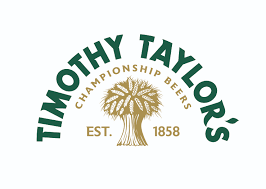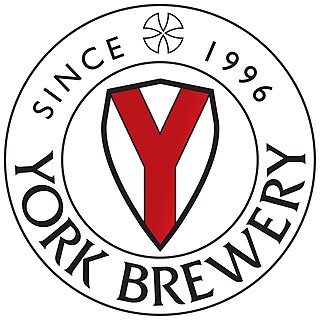
Beer is an alcoholic beverage produced by the brewing and fermentation of starches from cereal grain—most commonly malted barley, although wheat, maize (corn), rice, and oats are also used. The grain is mashed to convert starch in the grain to sugars, which dissolve in water to form wort. Fermentation of the wort by yeast produces ethanol and carbonation in the beer. Beer is one of the oldest alcoholic drinks in the world, the most widely consumed, and the third most popular drink after water and tea. Most modern beer is brewed with hops, which add bitterness and other flavours and act as a natural preservative and stabilising agent. Other flavouring agents, such as gruit, herbs, or fruits, may be included or used instead of hops. In commercial brewing, natural carbonation is often replaced with forced carbonation.

Pale ale is a golden to amber coloured beer style brewed with pale malt. The term first appeared in England around 1703 for beers made from malts dried with high-carbon coke, which resulted in a lighter colour than other beers popular at that time. Different brewing practices and hop quantities have resulted in a range of tastes and strengths within the pale ale family. Pale ale is a kind of ale.

Greene King is a British pub and brewing company founded in 1799, currently based in Bury St Edmunds, Suffolk. The company also owns brands including Hungry Horse and Farmhouse Inns, as well as other pubs, restaurants and hotels. It was listed on the London Stock Exchange (LSE), until it was acquired by CK Assets in October 2019.

Fuller's Brewery in Chiswick, west London, England, was the brewing division of Fuller, Smith & Turner PLC, a family-run business from its foundation in 1845 until 2019, when it was sold to the Japanese Asahi Breweries.

Beer has been brewed in England for thousands of years. As a beer brewing country, it is known for top fermented cask beer which finishes maturing in the cellar of the pub rather than at the brewery and is served with only natural carbonation.

Timothy Taylor's is a family-owned regional brewery, founded in 1858 by Timothy Taylor, in Keighley, West Yorkshire, England. Timothy Taylor's moved to larger premises in 1863 at Knowle Spring in Keighley, where they remain.
Nethergate Brewery was established in 1986 in Clare, Suffolk, England by former Head Brewer Ian Hornsey and his business partner Dick Burge. In 2005 the brewery site was moved across the county border to Pentlow in Essex. In 2010 the brewery was sold to anonymous buyers. From 2017 the brewery was based, back in Suffolk, in the hamlet of Rodbridge, near Long Melford.

McMullen's, known locally as Mac's, is a regional brewery founded in 1827 in Hertford, England. The brewery expanded during the second half of the 19th century by purchasing other breweries and their associated pubs.

Jennings Brewery was established as a family concern in 1828 in the village of Lorton, between Buttermere and Cockermouth in the Lake District, England. The brewery was started by John Jennings Snr, son of William Jennings. Jennings brewed exclusively in Lorton until 1874 when its present home, the Castle Brewery in Cockermouth, was purchased. The Lorton brewery closed some five years later.

Sharp's Brewery is a British brewery founded in 1994 in St Minver Lowlands, Rock, Cornwall, by Bill Sharp. Since 2011, the brewery has been owned by Molson Coors. It is best known for its flagship ale Doom Bar, named after the notoriously perilous Doom Bar sandbank in north Cornwall.

York Brewery is a brewery, formerly located in York within the city walls, owned by Black Sheep Brewery in Masham where York Brewery beers are currently brewed.

The Society for the Preservation of Beers from the Wood (SPBW), founded in 1963, is the oldest consumer-based group interested in stimulating the brewing of, increasing the awareness of, and encouraging the drinking of traditional cask ale. The Society also supports and encourages the use of wooden casks for beer dispense.

Beer is often made from barley malt, water, hops and yeast and so is often suitable for vegans and vegetarians. Some beer brewers add finings to clarify the beer when racking into a barrel. Finings can include plant-derived products, like Irish moss, or animal-derived products, like isinglass and gelatin.
Beer is produced through steeping a sugar source in water and then fermenting with yeast. Brewing has taken place since around the 6th millennium BC, and archeological evidence suggests that this technique was used in ancient Egypt. Descriptions of various beer recipes can be found in Sumerian writings, some of the oldest known writing of any sort. Brewing is done in a brewery by a brewer, and the brewing industry is part of most western economies. In 19th century Britain, technological discoveries and improvements such as Burtonisation and the Burton Union system significantly changed beer brewing.

Beer in Scotland is mostly produced by breweries in the central Lowlands, which also contain the main centres of population. Edinburgh and Alloa in particular became noted for the export of beer around the world in the 19th century.

T&R Theakston is a British brewery in Masham, North Yorkshire and the sixteenth largest brewer in the United Kingdom by market share. It is the second largest under family ownership, after Shepherd Neame, and is known for its Old Peculier beer.

Fuller's ESB (Extra Special Bitter) is a beer brewed by Fuller's at the Griffin Brewery in Chiswick, London. It has twice been named World Champion Beer, and has won CAMRA's Champion Beer of Britain Award on three occasions.
Worthington's White Shield was an India pale ale (IPA) available principally in bottle conditioned form.

Porter is a style of beer that was developed in London in the early 18th century. It is well-hopped and dark in appearance owing to the use of brown malt. The name is believed to have originated from its popularity with porters. Porter is a type of ale.


















